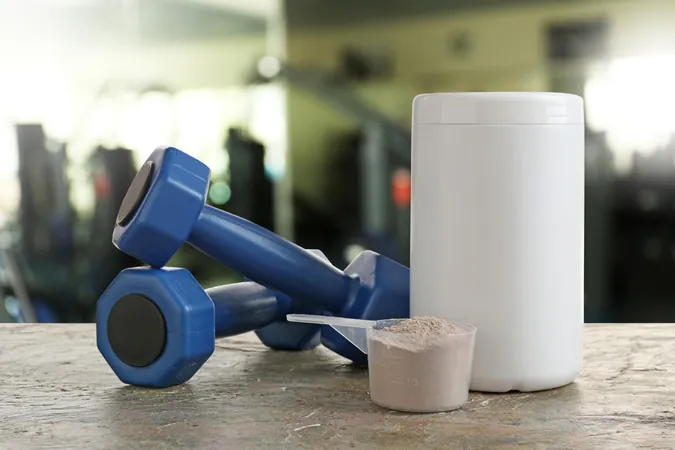
The Alarming Rise of Dry Scooping: What Every Gym-Goer Needs to Know
2025-04-02
Author: Li
Understanding Dry Scooping: A Closer Look
Dry scooping involves taking a scoop of pre-workout supplement directly, often followed by a sip of water. Proponents claim that consuming the powder dry allows for faster absorption into the bloodstream through the mucous membranes in the mouth, yielding quicker effects. However, this practice caught fire mostly through social media platforms like TikTok, with many demonstrating the technique without addressing the associated risks. Though dry scooping has been used by some athletes when water isn’t available, experts stress that it should not become a regular habit.
Key Health Risks Associated with Dry Scooping
The primary dangers of dry scooping stem from the high caffeine content found in many pre-workout supplements, which can range anywhere from 150 to 300 mg per scoop. Consuming caffeine in this manner leads to accelerated absorption, which increases the likelihood of adverse effects such as heart palpitations, dizziness, and even vomiting. Additionally, these dry powders often include ingredients aimed at enhancing blood flow and performance, like Citrulline and Arginine, which require adequate hydration to work effectively. Failing to use water not only enhances health risks but also hampers the expected benefits—they essentially nullify the purpose of taking these supplements to begin with.
The Dangers to Cardiovascular Health
For individuals with undiagnosed heart conditions, the impulsive ingestion of high caffeine concentrations can trigger critical cardiovascular issues. The body is not designed to handle such a rapid influx of stimulants, which can lead to dangerous spikes in heart rate and blood pressure, increasing the risk of serious complications.
Navigating the Unregulated Supplement Landscape
The supplement industry is notoriously unregulated, allowing for significant inconsistencies in product content. A pre-workout labeled with 200 mg of caffeine might contain anywhere from 50 to 500 mg—an unpredictable range that poses real risks to users. Unregulated products may lead to over-reliance on high doses, which can escalate to dependency and other health problems. For beginners or casual gym-goers, it’s wiser to avoid pre-workout supplements altogether. Many nutritionists argue that sufficient energy can be derived from a balanced diet or natural sources like coffee—a safer, healthier alternative.
Safer Alternatives to Enhance Performance
Instead of subjecting their bodies to the perils of dry scooping and high-caffeine pre-workouts, fitness enthusiasts should focus on fundamental areas for improvement: quality sleep, hydration, and nutrition. Aim for 8–9 hours of restorative sleep, as this is critical for recovery and optimal energy levels. Moreover, smart scheduling of workouts can also play a crucial role. Avoid exercising late in the evening, as this can disrupt sleep quality. A well-balanced diet that includes adequate electrolytes and vitamins can boost energy levels, with Vitamin D deficiency being a common culprit of fatigue. When high-intensity training days arise, if pre-workout supplements must be used, they should be approached with caution—ideally employed only on those unique occasions rather than as an everyday solution.
Conclusion
In conclusion, while the allure of dry scooping may be appealing for a quick energy fix, the potential health risks far outweigh the perceived benefits. Prioritizing natural energy boosts through lifestyle adjustments not only promotes better performance in the gym but also safeguards overall health. Make informed choices, and remember, there's no substitute for a well-nourished body!




 Brasil (PT)
Brasil (PT)
 Canada (EN)
Canada (EN)
 Chile (ES)
Chile (ES)
 Česko (CS)
Česko (CS)
 대한민국 (KO)
대한민국 (KO)
 España (ES)
España (ES)
 France (FR)
France (FR)
 Hong Kong (EN)
Hong Kong (EN)
 Italia (IT)
Italia (IT)
 日本 (JA)
日本 (JA)
 Magyarország (HU)
Magyarország (HU)
 Norge (NO)
Norge (NO)
 Polska (PL)
Polska (PL)
 Schweiz (DE)
Schweiz (DE)
 Singapore (EN)
Singapore (EN)
 Sverige (SV)
Sverige (SV)
 Suomi (FI)
Suomi (FI)
 Türkiye (TR)
Türkiye (TR)
 الإمارات العربية المتحدة (AR)
الإمارات العربية المتحدة (AR)